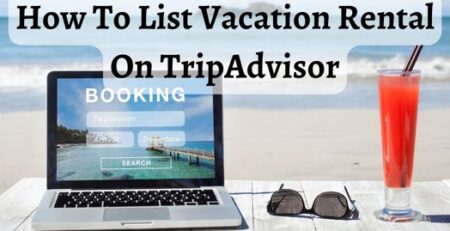How To Buy A Vacation Rental Property: The Ideal Real Estate Investment
Exploring new places is one of life’s greatest pleasures, but the cost of the trip can sometimes be high. Purchasing a vacation rental property is an opportunity to explore new horizons while also building financial strength and security. This article will give helpful tips on how to buy a vacation rental property that works well, so that readers can make smart choices that both fulfill their dreams and keep their money safe.
The decision-making process involved in buying a vacation rental property requires careful consideration. Prospective buyers should understand the local market conditions as well as any potential regulatory hurdles before they commit to this significant purchase.
Additionally, it is essential for buyers to evaluate all costs associated with purchasing and maintaining the investment over time.
This guide will help potential buyers get through these important steps so they can start their own journey to success, one that is based on financial security and long-term stability instead of risk or uncertainty.
Benefits Of Owning A Vacation Rental Property
Owning a vacation rental property can be very profitable because it lets an investor make passive income and build equity in real estate. Vacation properties are attractive investments due to their potential for higher returns and appreciation over time as compared to other types of rentals. When considering investing in a vacation rental property, there are many advantages that come with this type of investment that should not be overlooked.
The first benefit is financial: when investing in a vacation rental property, investors will have the chance to earn money through short-term renting or long-term leasing out their units at market prices. Also, raising prices every so often throughout the year could bring in even more money from holiday travelers looking for places to stay during busy travel times. Also, if the owner decides to sell the property at some point, they could get a big return on what they paid for it in the beginning.
One of the best things about owning a vacation rental property as an investment is that you can use it yourself whenever you want without having to pay rent or find somewhere else to stay. This provides owners with access to luxurious destinations around the world at no additional cost. In addition, since most guests prefer staying in furnished homes rather than hotels or hostels, owners can furnish their units according to personal preference and create unique experiences for each guest, thus adding value and further increasing the total revenue generated by the rental unit.
Moving forward and analyzing how one would finance such an endeavor requires insight into both traditional lending options and alternative financing solutions available today.
Financing Your Vacation Property

Financing a vacation rental property can be done in several ways. One of the most common methods is to apply for a loan from a mortgage lender, who will evaluate your credit score and financial history before providing you with the necessary funds. Additionally, investors may use other real estate investment strategies, such as buying a second home or using the equity in their primary residence to purchase another property. Regardless of what method is chosen, it’s important to carefully consider all financing options prior to making any decisions, which will help with purchasing the short-term rental.
Property management companies are also available to help manage the finances related to owning a vacation rental property. They can provide advice on how much rent should be charged for each unit and handle all accounting needs, including collecting payments from tenants and paying bills, taxes, insurance premiums, and more. This type of service can make it easier for owners to focus on growing their business rather than worrying about day-to-day finances.
When considering investing in short-term rentals, research local laws regarding regulations that could affect your ability to operate legally within the area. It’s also wise to consult an experienced attorney when dealing with legal matters pertaining to purchasing a vacation rental property; they can offer insight into potential pitfalls like zoning restrictions that might not allow short-term renters in certain areas or regions. With these tips in mind, you’ll be well prepared to finance your future vacation rental property and reap its many benefits.
Choosing the right location for your new venture requires careful consideration too—ensuring it meets both your budget and lifestyle goals.
Choosing the Right Location
When investing in a vacation rental property, the location of the property is an essential factor to consider. The right area can attract numerous guests and generate income for years. When researching potential locations for investment, it is important to look at estate market trends and study local regulations concerning rental properties.
Additionally, one should examine typical rental prices in comparison with the cost of upkeep and management services from a reliable property manager. Property managers typically handle all aspects of managing the property on behalf of the owner, such as screening tenants, collecting rent payments, handling maintenance requests, or other tasks related to daily operations.
By letting someone else take care of these tasks, investors can spend more time growing their rental business without having to worry about the boring parts of running a vacation rental. Furthermore, hiring an experienced property manager also helps ensure that renters will have positive experiences throughout their stay, which can help build brand loyalty among customers over time. Florida is also a fantastic place to consider when buying vacation/ short-term rental.
Additionally, understanding the local real estate market dynamics is critical when selecting a suitable location for your vacation rentals. Knowing average occupancy rates, seasonality variations in pricing, and expected rental income per month can assist in making informed decisions regarding investments in specific areas and maximizing returns over time. This knowledge allows investors to make educated decisions while evaluating opportunities in different markets around the world before taking any risks by committing resources towards purchasing a particular piece of property.
With this information in mind, investors can choose the most appropriate location for their investment and know what kind of return they can expect from their venture prior to entering into any agreements with sellers or brokers. Home inspection and maintenance considerations must also be taken into account when considering the acquisition of a vacation rental property as part of an overall portfolio strategy for long-term wealth creation through passive income streams generated from multiple sources.
Home Inspection and Maintenance Cost And Efforts

Buying a vacation rental property is an exciting step towards freedom. It requires careful inspection of the home and routine maintenance to ensure profitability. Vacation properties come with unique advantages but also require special considerations for long-term success.
A potential buyer should hire a qualified inspector to thoroughly examine the property prior to purchase. This will identify any deficiencies in the structure or mechanical systems that might be overlooked at first glance. The inspector’s report should include specific recommendations on how to best remedy any issues they find.
Properly maintaining a vacation rental property is essential for it to remain profitable. Regular inspections should be conducted throughout ownership to identify any developing problems before they become serious liabilities. Homeowners must adhere to safety regulations, properly equip furnishings and fixtures, and stay up-to-date with all necessary repairs or renovations.
These procedures provide peace of mind when buying a vacation rental property by ensuring it meets standards set forth by local authorities and industry experts alike while avoiding costly surprises down the line. Taking these steps provides assurance going forward as owners consider important considerations for rental income from their new investment.
Considerations For Rental Income During Good And Bad Times
Once a home inspection is complete and any necessary maintenance work has been done, it’s time to consider the rental income that can be generated from buying a vacation property. Investing in a vacation rental requires careful consideration of factors such as location, seasonality, amenities provided, and competition.
Location plays an important role when investing in how to buy a vacation rental property; buyers should look for properties close to popular attractions yet away from areas with high levels of tourist traffic. Seasonality must also be taken into account; understanding peak seasons and shoulder seasons will help potential investors secure more lucrative rental agreements. The availability of amenities at the property is another factor to consider; having multiple bedrooms or bathrooms may attract larger groups looking for longer stays during peak periods. Finally, research should be conducted on what other similar properties are available in the area so that rates can be set accordingly.
Investors who understand these considerations before purchasing a vacation rental property stand to benefit significantly from their investment by establishing long-term relationships with renters and earning higher profits due to increased demand. By taking all factors into account prior to making an offer on a property, savvy investors can maximize their returns over time while minimizing the risks associated with this type of real estate investment. Having done thorough research regarding rental income prospects, it is now time to explore the tax implications of investing in vacation properties.
Tax Implications Of Investing In Vacation Properties

According to the National Association of Realtors, vacation home sales rose an impressive 6.5% in 2022 compared with 2023. This highlights a growing trend towards investing in second homes as rental properties for tourists and other short-term visitors. However, before purchasing such a property, it is essential to understand the various tax implications involved.
Firstly, when buying a vacation rental property, investors need to be aware that they may qualify for certain deductions related to loan interest payments or operating expenses associated with maintaining the property. Additionally, capital gains exemptions may apply if the owner sells their property within two years of the purchase date; however, this should only be done after consulting a qualified financial advisor, who can help determine how much you will owe in taxes upon resale.
Furthermore, owners should remember that all income generated from renting out their vacation homes must be reported on their individual or corporate tax returns each year. Depending on where you live and what type of business entity owns the property, there are different state and federal taxes applicable, which could include local occupancy taxes plus any additional fees required by municipalities or counties where the residence lies. It is important to consider these costs prior to proceeding with a purchase so you know exactly what kind of return on investment you’ll receive over time.
To ensure protection against potential losses due to natural disasters or tenant damage, it is wise for prospective buyers to research renters’ insurance policies available in their area before making a decision about purchasing any sort of real estate as an investment opportunity.
Renters Insurance Policies: The Pros And Cons
When investing in a vacation rental property, it is important to consider renters insurance policies. Renters insurance provides protection against losses from theft and other risks that may occur while the unit is being rented out. It can also provide coverage for physical damage caused by tenants or their guests.
Here Are 3 Key Points To Consider When Looking At Renters Insurance:
- Liability Coverage: This covers medical bills or legal fees if someone becomes injured on your property and decides to sue you as the owner of the rental unit.
- Personal Property Coverage: This provides coverage for furniture and other items within the rental unit that belong to the tenant in case they get stolen or damaged due to fire, weather, or vandalism.
- Replacement Cost Value (RCV): This type of policy covers replacement costs instead of depreciated value, so you will be reimbursed for what you paid for an item rather than its current market value.
Renters insurance can help protect both owners and tenants from unexpected damages and losses resulting from unforeseen events. Taking advantage of these types of policies is one way to reduce potential financial headaches down the line when owning a vacation rental property. With this knowledge in hand, owners should now turn their attention towards advertising and marketing strategies that will draw renters into their units.
Advertising And Marketing Strategies To Ensure You Always Have A Positive Return

The anticipation of a vacation rental can evoke feelings of freedom and relaxation. With the right marketing strategies, these emotions can be tapped into as potential customers search for their perfect getaway. To maximize visibility, property owners should leverage both online and offline methods to reach out to travelers.
Online advertising includes creating a website or listing on popular travel websites such as Airbnb and TripAdvisor. A well-crafted description highlighting unique amenities is essential in order to stand out in an increasingly crowded market. Additionally, utilizing social media channels such as Instagram and Facebook allows for direct engagement with travelers; sharing pictures of special features and providing customer service will lead to increased bookings. Furthermore, using targeted ads that are tailored to specific demographics increases the likelihood of attracting visitors who fit the desired profile.
Offline methods include word-of-mouth referrals from friends, family members, and previous guests; newspaper and magazine listings; flyers; brochures; radio advertisements; television commercials; billboards, etc. Utilizing this type of advertising helps create brand recognition by emphasizing a consistent message across different mediums, which leads to higher conversion rates over time.
To capitalize on existing relationships within the local community, co-branding initiatives with hotels, restaurants, or other tourist attractions could also prove beneficial in increasing occupancy rates. As we transition seamlessly into setting rules and regulations for guests, it is important that property owners establish clear expectations early on so there are no misunderstandings later down the road. This is by far one of the most important steps on how to buy a vacation rental property.
Setting Rules And Regulations For Guests – Keep Your Neighbors Happy
Once you have purchased a vacation rental property, it is important to set rules and regulations for guests. This helps ensure that tenants are respectful of their surroundings during their stay. There are several key points to consider when setting these rules:
- Establish clear housekeeping expectations.
- Set noise level limits.
- Put in place occupancy restrictions.
It’s also important to think about the types of amenities you want your tenants to have access to. For example, do you want them to be able to use the pool or hot tub? Do they need permission before bringing pets? Setting boundaries such as these will help make sure tenants understand what’s expected of them while staying at your property. Additionally, providing information on local attractions can give them ideas for activities once they arrive.
Finally, working with homeowner associations or neighborhoods in your area may provide helpful insight into any specific requirements regarding vacation rentals. Knowing how long a tenant can stay, if there are any fees associated with renting out the property, and other pertinent details will help ensure both parties remain compliant throughout the rental process. With an understanding of all applicable laws and regulations concerning rental properties in place, you can feel confident that everything runs smoothly from start to finish.
Working With Homeowners Associations Or Neighborhoods

When it comes to buying a vacation rental property, working with homeowners associations and neighborhoods is essential. While appealing to potential buyers by offering an attractive neighborhood can be beneficial, there are also certain requirements that must be met in order for the purchase of the property to go forward. Understanding these rules and regulations and abiding by them will help ensure that the entire process runs smoothly.
First, it is important to understand any local ordinances or laws related to short-term rentals before making a purchase offer on a vacation rental property. In some cities, such as Fort Lauderdale, renting out units for less than 30 days at a time may actually be illegal. Therefore, researching applicable zoning laws prior to investing in a vacation rental property is imperative. Additionally, familiarizing yourself with any existing homeowner association policies that could affect your investment is vital. It may even be necessary to attend meetings of the HOA in order to receive approval from other members before proceeding with the purchase of the property.
In addition to understanding local laws and HOA guidelines when purchasing a vacation rental property, getting acquainted with neighbors and community members beforehand can provide insight into what kind of impact this type of investment might have on surrounding residents. Doing so allows you to build relationships ahead of time, which can make obtaining approval easier down the line should any issues arise between owners and renters during their stay. Furthermore, having positive relationships within the communities where your properties are located can open up new opportunities while providing additional support if needed throughout the duration of owning the home.
With all these factors taken into consideration when looking into buying a vacation rental property, deciding whether or not partnering with a property management company would be advantageous should come next in line.
Property Management Companies Might Be Your Best Bet
When purchasing a vacation rental property, it is important to consider the services of a reputable property management company. Property management companies offer homeowners the ability to outsource some or all aspects related to their rental properties. This can include tenant screening and selection, rent collection, maintenance and repair coordination, marketing of the property, as well as financial record keeping and reporting.
Before selecting a property management company, it is critical that potential buyers research each candidate thoroughly in order to make an informed decision. The Better Business Bureau (BBB) offers information about businesses, such as customer reviews and any complaints against them. It is also beneficial for prospective owners to speak with current clients of the respective candidates in order to gain insight into how they conduct business.
Questions should be asked regarding the fees charged by the company, what services are included in those fees, how quickly they respond to requests from tenants, and if legal issues arise with tenants or other parties associated with the rental property, does the company have experience handling such matters?
Once a suitable partner has been identified, it is crucial for both parties to sign a contract that outlines their expectations and responsibilities. By doing this upfront work prior to entering into an agreement with a property management firm, buyers can ensure that their interests are protected while minimizing the risk associated with managing their investment properties. With these steps taken care of, investors may now focus on best practices for managing tenants at their vacation rental properties.
Best Practices For Managing Tenants
Finding tenants for a vacation rental property is an important step in the process of purchasing one. It is also essential to understand best practices for managing these tenants once they are on board. Adopting certain guidelines can help ensure that both parties have a positive experience and protect the interests of the owner as well.
First, it is important to be clear about expectations from the start. In addition to setting out rules such as no smoking or pets, owners should also establish policies regarding fees, deposits, and cleaning services.
Doing so will avoid any misunderstandings further down the line. Furthermore, it may be prudent to store copies of all the paperwork involved in the tenancy agreement with a third party who can act as a mediator if needed later on.
In order to maintain good communication throughout the duration of their stay, owners should take steps to reach out periodically but not too often; this could include sending emails or checking in via phone call at appropriate times before and during visits. This way, both parties know that issues are being addressed quickly and amicably if anything arises. Additionally, providing excellent customer service by responding promptly to messages or inquiries sent by tenants goes a long way towards creating trust between them and the landlord.
By taking care when selecting tenants and following through with transparent communication channels, landlords can ensure smoother operations while renting out their vacation property investment. Home improvement projects can then be undertaken with confidence, knowing that there exists an established relationship between tenant and owner that facilitates mutual respect.
Home Improvement Projects To Increase Rental Income

Making improvements to a vacation rental property can be an effective way of increasing the amount of money that is generated from it. Improvements not only add value but also make guests feel more comfortable and welcome in their temporary home away from home. Home improvement projects should take into consideration both aesthetic appeal and practicality for tenants. This includes upgrades to existing features such as paint colors, fixtures, furniture, and appliances, or adding new amenities like decks, patios, fire pits, hot tubs, or game rooms. While these investments may increase initial costs upfront, they will ultimately result in higher rent prices and bigger returns on investment over time.
When planning out potential home improvement projects for your vacation rental property, focus on making updates that are both cost-effective and impactful in terms of increasing tenant satisfaction levels. Consider what changes could be made to enhance the overall experience for visitors staying at your property without breaking the bank. Simple upgrades, such as replacing outdated light fixtures with modern ones or adding art pieces to walls, can go a long way towards creating a positive impression that will bring people back again and again. Additionally, installing smart technology solutions such as automated climate control systems or keyless entry locks provides convenience while also improving security measures.
By taking steps to improve the quality of one’s vacation rental property through strategic renovations and additions, landlords can attract high-paying customers who are looking for short-term accommodations that offer all the comforts of home. Ultimately, this leads to increased profits due to improved occupancy rates and higher nightly rates, which translate into a greater return on investment in the end. With carefully planned home improvement projects tailored to individual tastes combined with well-thought-out pricing strategies set accordingly, it is possible to maximize earning potential from any given vacation rental property.
Tips For Setting Rates And Making Money With Vacation Homes
Setting rates and making money with a vacation rental property can be achieved in several ways. To maximize your profits, it is important to understand the basic principles of pricing and yield management. The most successful vacation home owners use an array of strategies that include:
- Leveraging Seasonal Demand Variations: By adjusting prices based on seasonal demand variations, you are able to capitalize on peak times when travelers are willing to pay more for accommodations. This will enable you to make more money during those high-demand periods.
- Utilizing Discounts and Promotions: Offering discounts or promotions such as last-minute deals or early bird specials can help fill vacant weeks or bring in repeat customers who may become regular renters.
- Establishing Service Fees: Charging extra fees for services such as cleaning, laundry, pet sitting, etc. helps increase revenue without having to raise nightly rental rates significantly.
With proper planning and execution, these strategies can result in higher occupancy rates and increased revenues for your vacation rental business. However, setting rates too high might put off potential guests, while charging too little could leave you missing out on income opportunities. Finding the right balance between price and value can take some trial and error, but there are resources available online to help guide you through this process. With the right approach, you can create a profitable venture that also provides great experiences for your guests.
By understanding how to best set your rental rates and taking advantage of the various strategies outlined above, you can optimize your profit margins while providing stellar service at competitive prices—all key components necessary for success in today’s highly competitive vacation rental market. Moving into alternatives to buying a vacation rental property opens up another door of opportunity if owning a physical asset isn’t feasible.
Alternatives To Buying Vacation Rental Properties

With the potential for high returns on vacation rental properties, it can be tempting to buy one. But there are alternatives that may provide similar advantages without the long-term commitment or financial burden of ownership. What options exist besides buying a property?
The first alternative is to rent out your own home as a vacation rental when you’re not using it. This allows homeowners to make money while they aren’t living in their residence and take advantage of short-term rentals with minimal effort. It’s also possible to use professional services such as Airbnb or VRBO (Vacation Rental By Owner), which allow owners to list their homes online and manage bookings digitally.
Not only does this give property owners a larger pool of customers, but it also eliminates some of the administrative tasks associated with renting out a house. Another option is to become an investor in a vacation rental business such as Vacasa short term property management and rentals or Turnkey Vacation Rentals, which specialize in managing short-term rentals on behalf of multiple investors. These companies offer comprehensive services, including marketing, booking management, guest screening, maintenance, and more—all at reduced costs compared to traditional property ownership. They even guarantee certain levels of income from each investment property, so investors don’t have to worry about fluctuating rates during slow seasons.
For those who seek profits from vacation rental investments without having to purchase a property outright, these alternatives may offer greater flexibility and fewer risks than owning real estate directly. With careful research and due diligence, individuals may find that investing in other types of assets yields higher returns with less hassle than purchasing physical properties themselves.
Final Thoughts On Buying A Vacation Investment
Vacation rental properties can provide a lucrative investment opportunity. According to research conducted by the National Association of Realtors, vacation rentals have grown in popularity over the past several years, with nearly one-third of Americans taking at least one leisure trip per year. With such high demand for short-term vacation housing, finding and maintaining reliable tenants is essential to successfully owning and operating a property.
The process of purchasing a vacation rental property requires careful planning and consideration. Prospective owners should begin by researching local zoning regulations related to short-term leasing as well as any additional taxes or fees associated with ownership. Once an appropriate location has been identified, it is important to consider ways to attract travelers and ensure that the property meets all safety standards necessary for renting out rooms on a short-term basis.
Additionally, proper maintenance schedules should be established for regular inspections and repairs in order to keep costs manageable while preserving the value of the property to avoid increased cost later.
Overall, investing in a vacation rental property can be both profitable and rewarding if done correctly. However, due diligence must be exercised throughout the entire process, from selecting an ideal location to advertising amenities, in order to maximize the return on investment while providing quality service for guests who rent the space. So now you already know how to buy a vacation rental property.
FAQs
What Is The Best Way To Find A Reliable Tenant For Vacation Rentals?
Finding a reliable tenant for any type of property can be daunting, especially when it comes to vacation rental properties. It is important to have the right tenant in place to ensure that all relevant laws and regulations are met while creating an enjoyable experience for both the landlord and their guests.
There are several steps that landlords should take to find reliable tenants for their vacation rental property. These include conducting background checks on prospective tenants, asking questions about past experiences with similar rentals, and setting clear expectations prior to signing any lease agreements. Additionally, properly advertising the property is essential in order to attract potential renters who would be a good fit. Allowing parties interested in renting the property time to view it before making a decision is also helpful.
In order to make sure that only those individuals best suited for the role of being a responsible tenant occupy the space, landlords should remain vigilant throughout the process by researching reviews from previous tenants or requesting references from them if possible. Doing so will provide peace of mind, knowing that appropriate measures were taken during selection and adequate due diligence has been performed. Moreover, having open communication between the landlord and tenant regarding rules related to maintenance or damage repair can help create smooth relations long after the tenancy begins.
What Are The Best Ways To Attract Travelers To A Vacation Rental Property?
Attracting travelers to a vacation rental property is an essential part of running a successful business. There are several methods that can be used to draw in potential customers and create awareness of the rental property. A few popular ways include leveraging digital marketing, utilizing local advertising, tapping into referrals from past guests, and offering special deals or discounts.
Are There Any Additional Fees Or Taxes Associated With Owning A Vacation Rental Property?
Owning a vacation rental property can be an exciting and rewarding experience, but there are certain fees and taxes that need to be taken into consideration. This article will discuss what potential additional costs one should expect when owning a vacation rental property:
- Property Taxes
- Maintenance Fees
- Vacation Rental Licensing & Regulations
When considering the purchase of a vacation rental property, it is important to understand all associated expenses in order to properly plan for long-term profitability. Property taxes vary widely by location, so researching local tax rates and policies before making a purchase decision is essential. Additionally, maintenance fees such as utilities, insurance premiums, HOA dues, and cleaning services must also be factored in. Most municipalities have their own regulations on short-term rentals, which may include requirements for licenses or permits; these too should be researched prior to investing.
The key takeaway here is that while ownership of a vacation rental can bring great financial rewards, understanding the full scope of associated fees and taxes is critical to ensuring success over the long term. It’s crucial that investors take time to research each item listed above as well as any other relevant details pertaining to their specific situation prior to signing on the dotted line. With proper planning and an understanding of all related costs, one can confidently move forward with purchasing their dream vacation rental property without fear of unexpected surprises down the road.
How Often Should A Vacation Rental Property Be Inspected And Maintained?
Owning a vacation rental property can be an exciting investment opportunity, but it is important to remember that maintenance of the property must also be taken into account. How often should a vacation rental property be inspected and maintained? This question can be answered by considering factors such as local regulations, customer expectations, and the condition of the existing property. When determining how often a vacation rental property should be inspected and maintained, local regulations in relation to safety standards may need to be considered. Depending on where the property is located, there might exist specific codes or laws regarding necessary upkeep for properties used as vacation rentals. Therefore, knowledge of these regulations will help protect both the owner and renters from potential legal issues related to negligence.
Customer expectations are another factor when deciding how frequently inspections and maintenance should take place at a vacation rental property. People who are looking for short-term accommodation expect certain levels of comfort and cleanliness during their stay; this means that regular checkups have to occur in order to ensure high quality service. In addition, any items needing repair or replacement due to wear-and-tear must also be attended to in a timely fashion so as not to disrupt customers’ enjoyment of their holiday experience.
The condition of the existing structure should also play a role in determining the inspection frequency for a vacation rental property. If there are known areas that require more frequent attention than other parts of the building, then they should be prioritized accordingly when scheduling routine checks and repairs. It is worth noting that owners may want to weigh up the costs associated with proactive maintenance versus reactive solutions since preventative measures typically cost less than fixing an issue after it has already occurred.
In summary, various factors come into play when assessing how often inspections and maintenance need to happen at a vacation rental property, including local regulations, customer expectations, and the condition of existing structures, all of which contribute towards creating safe and pleasant experiences for visitors staying at the residence.
Is There Any Way To Reduce The Costs Associated With Owning A Vacation Rental Property?
Owning a vacation rental property can come with costly expenses, but there are ways to reduce them. From a financial standpoint, reducing the costs associated with owning a vacation rental is important for any investor looking to maximize their return on investment while still meeting the standards of quality that guests expect. This article will explore some methods one may take in order to minimize the cost of ownership and make their venture more profitable.
One way an owner can save money is by utilizing resources already available to them. Researching local tax incentives or grants could help defray the cost of certain improvements or repairs made to the property. Additionally, choosing materials from outlets such as bulk stores or discount retailers can significantly reduce the amount spent per item purchased. Finding creative solutions like these is essential when trying to manage initial costs as well as ongoing maintenance fees.
Another strategy investors may use is outsourcing tasks that don’t require direct oversight from them. Hiring professionals for specific jobs such as plumbing, electrical work, cleaning services, and other related duties can be more cost-effective than doing it all oneself; this is especially true if the time saved allows investors to focus on generating revenue rather than performing mundane, laborious tasks. Furthermore, taking advantage of digital tools such as online booking systems and automated payment processors helps streamline operations while also providing additional income sources through increased bookings due to improved marketing visibility and convenience.
By leveraging existing resources and hiring qualified personnel where necessary, owners have numerous options at their disposal to cut down on costs without sacrificing quality or profitability—something critical for long-term success in this lucrative industry.











